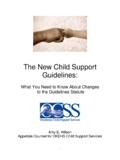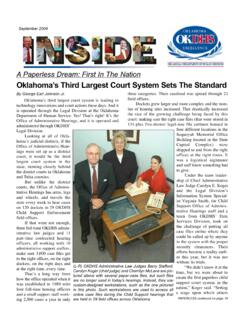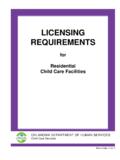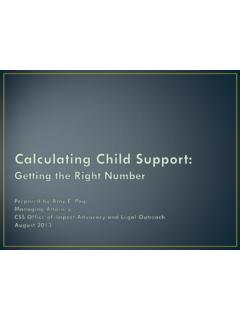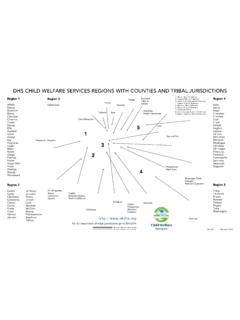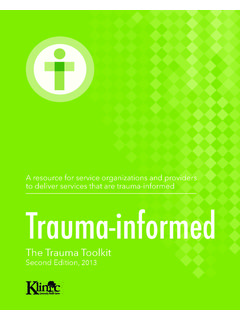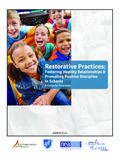Transcription of Oklahoma Children of Incarcerated Parents Toolkit - …
1 DHS Pub. No. 14-63 Issued 12/2014 This publication is authorized by Oklahoma Department of Human Services Director Ed Lake and printed by DHS in accordance with state and federal regulations at a cost of $ for 344 copies. Copies have been deposited with the Publications Clearinghouse of the Oklahoma Department of Libraries. DHS offices may request copies on ADM-9 (23AM009E) electronic supply orders. Members of the public may obtain copies by calling 1-877-283-4113 (toll free), by faxing an order to (405) 962-1741, or by downloading a copy at Special Acknowledgement and AppreciationThis Toolkit is the result of a collaborative effort that included support from the Oklahoma Department of Human Services, the Oklahoma Commission on Children and Youth and the Oklahoma Children of Incarcerated Parents Advisory Committee.
2 Special appreciation goes to the stakeholders, who by their dedicated efforts created this Toolkit that can be used by many to help families affected by Childrenof Incarcerated Parents .. Children of Incarcerated Parents Toolkit Table of Contents Introduction 1 How to Use This Toolkit2 Families and Caregivers 2-6 Should I Apply for This? 7-9 Oklahoma Programs and Agencies that Offer Services and Supports to Families10-11 Mentoring, Supports and Youth Organizations12-13 Other Toolkits and Guides14 Faith-Based Organizations14 Lists and Videos for Children .
3 Caregivers and Providers15 Resources for Policymakers 16 -17 Books for Families/Caregivers and Service Providers 18 Research and Information for Service Providers19 National Organizations20 References21 Introduction If you have suddenly started taking care of a child whose parent is in jail or prison, or you are the primary caregiver to your grandchildren while their Parents are in jail or prison, this Toolkit is for you. If, last night, law enforcement came to your home and arrested your husband, wife, boyfriend or girlfriend in front of the Children , this Toolkit is for you.
4 If you are a teacher or a school counselor who knows that your student s parent is in jail or prison, this Toolkit may be for you. If you are a teacher and a child is asking difficult questions related to the criminal justice system, this Toolkit may be for you. If you are a social worker looking for resources to help a foster parent with a child whose mother or father was arrested last night, this Toolkit may be for you. If you operate a day care center and your client needs a place for her kids to stay for a few nights because she was arrested on a probation violation and needs some time to figure things out, this Toolkit may be for you.
5 If you are a caregiver, educator or service provider who has or knows of family members in the criminal justice system for a few days, months, a year, a decade or maybe for life, this Toolkit may be for you. How to Use this Toolkit The Toolkit is designed for you, the caregiver, service provider or educator, to find answers to questions that may apply to you and your child, client or student. The resource list provides a wealth of free information available on the Internet. We have divided this Toolkit into various sections from family support programs, to tips for caregivers and educators, to finding answers to questions a child or a student may ask about their parent s arrest or incarceration.
6 This Toolkit was written and edited by the Oklahoma Children of Incarcerated Advisory Committee, with the help of stakeholders, ranging from caregivers, Parents , faith-based community members, counselors, educators, social workers, community leaders, child specialists, etc. Families/Caregivers/Educators/Service Providers When a child s parent goes to prison or jail, with rare exception, the child mourns. They may miss the parent who played with them, cooked for them, or watched TV with them, and doing these things may increase their sadness. Or, if their Incarcerated parent was not available before imprisonment, the child may mourn the loss of the hope of what might have been if only Mom or Dad had not gone away.
7 Either way, the time when a parent is imprisoned is a time when Children wait and often hope. They wait for Mom or Dad to come back to take care of them, the way they did before, or they wait for the return of a parent who has been changed and made better by their time in prison. They also hope that this time Mom or Dad will stay. The caregivers of Children of prisoners may have many things in common. They cope with the criminal justice system, deal with the impact on the Children , have to find ways to make ends meet, deal with their own feelings toward the child s Parents , and struggle with how to answer Children s questions. But each family and each caregiving circumstance is also unique.
8 Caregivers could be the Incarcerated parent s parent, another grandparent, an aunt, or older sibling. A caregiver might be a family friend, foster parent or group home staff member. Some caregivers took on the responsibility by default because there was no one else, while others were already the guardians of the Children before the parent became Incarcerated . 1 Some caregivers are unrelated to the child by blood but are the friends, girlfriends, boyfriends or partners of one of the child s Parents . Some Children are in foster care with adults they did not know before their parent went to prison. In some cases, Children moved far away from the homes they were living in prior to their parent s arrest and incarceration and find themselves in new and unfamiliar environments.
9 Meanwhile, most caregivers are expected to raise the Children , keep them connected in some way to their imprisoned parent, earn a living, and care for other members of the family. It may be difficult for caregivers to respond consistently to the feelings and behaviors of these Children . Teachers, health care providers, social workers, clergy and those who work as coaches, librarians and recreation directors are not trained to help Children or their caregivers cope with this crisis. Influences on the Caregivers Ability to Cope: The degree of familiarity they have with the child The intensity of change and upheaval in the child s life Economic stress/instability, or the oppression of poverty Degree of isolation, whether in urban, suburban or rural settings Caregiver s health and emotional well-being Quality of the child s school Caregiver s job satisfaction Community resources Support of family and friends Family spirituality and faith The impact of racial and ethnic prejudices Presence of knowledgeable professionals From Interviews with Caregivers What Do Children of Prisoners and Their Caregivers Need?
10 (Adalist Estrin, Family and Corrections Network FCN). Every child, family and circumstance is different. Some Children are use to Parents who were not around much before their incarceration. Some Children have Parents who are unpredictable because of depression or drugs or alcohol. Other Children s Parents were actively involved with them before they went to jail or prison. Some Children may have been traumatized by witnessing a violent arrest or may have a history of traumatizing experiences. Some Children of prisoners may have no contact with their parent; others talk to their Incarcerated parent every day. Some Children move to a new city or state.

